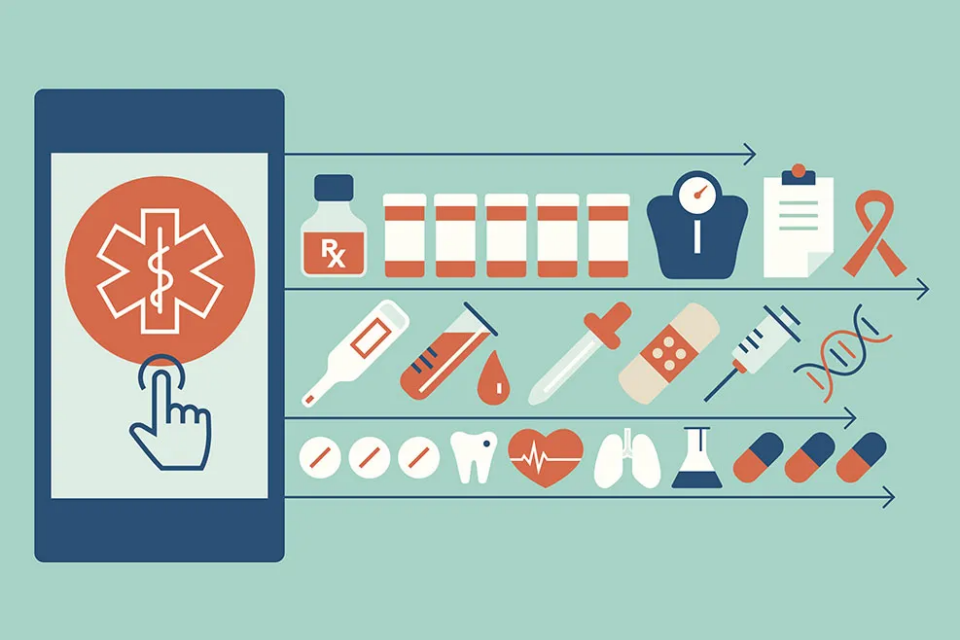In today’s tech-driven world, medical apps have emerged as a game-changer in the healthcare industry. These groundbreaking applications are reshaping the way patient care is delivered, enhancing communication between doctors and patients, and streamlining various medical processes. Join us as we delve into the realm of medical apps, exploring their advantages, statistics, popular examples, and the compelling reasons why healthcare MVP development in 2023 is a worthwhile endeavor.
Grasping the Concept of Medical Apps and Their Advantages
Medical apps are ingenious digital tools meticulously crafted to assist in healthcare-related tasks, offering a myriad of functionalities that benefit both medical professionals and patients. Let’s delve into some key advantages:
– Unparalleled access to healthcare information: Medical apps provide users with instant access to a wealth of medical knowledge, empowering them to make well-informed decisions about their health and well-being.
– Seamlessly bridge the communication gap: These apps facilitate smooth and effortless communication between doctors and patients, paving the way for virtual consultations, hassle-free appointment scheduling, and seamless sharing of vital medical records.
– Master medication management: Medical apps offer indispensable features such as medication schedule tracking, timely reminders, and vigilant dosage monitoring, ensuring that patients adhere to prescribed treatments with precision.
– Embrace the era of remote patient monitoring: Thanks to medical apps, healthcare providers can seamlessly monitor patients’ vital signs and health conditions from a distance, significantly reducing the need for frequent hospital visits while ensuring comprehensive care.
Compelling Statistics Demonstrating the Impact of Medical Apps
The transformative impact of medical apps is undeniable, as reflected in the following eye-opening statistics:
– Recent projections indicate that the global medical app market is set to skyrocket, estimated to reach a staggering value of $111.1 billion by 2026, boasting an impressive annual growth rate.
– The sheer abundance of health-related mobile applications available across diverse platforms has surpassed a staggering figure of 100,000, catering to a wide array of medical needs and requirements.
– A comprehensive survey conducted among healthcare professionals revealed that an astounding 93% of physicians firmly believe that medical apps possess the immense potential to significantly improve patient health outcomes.
– Mobile health apps have witnessed an unprecedented surge in popularity among consumers, with an astounding 88% of smartphone users placing their trust in these apps for their healthcare needs.
Prominent Examples of Revolutionary Medical Apps
In today’s digital landscape, numerous medical apps have garnered immense recognition and popularity due to their remarkable effectiveness and user-friendly interfaces. Let’s explore a few notable examples:
– Medscape: This comprehensive medical resource app serves as a treasure trove for healthcare professionals, offering them unfettered access to a wealth of medical news, drug information, clinical references, and invaluable educational materials.
– MyChart: A revolutionary app that empowers patients by granting them secure access to their electronic health records, facilitating seamless appointment scheduling, real-time messaging with healthcare providers, and instant access to test results.
– Epocrates: Widely acclaimed and widely used, this app provides physicians with expedited access to vital drug information, valuable insights on interactions, dosage calculators, and a stream of crucial medical news.
– Fitbit: Primarily recognized as a fitness app, Fitbit goes above and beyond by meticulously monitoring heart rate, sleep patterns, and physical activity, providing users with indispensable health insights.
The Significance of Embarking on Medical App Creation in 2023
Amidst the dynamic landscape of healthcare, crafting a medical app in 2023 holds undeniable significance for several compelling reasons:
– Surging demand for telemedicine solutions: The unprecedented rise of telemedicine, further fueled by the COVID-19 pandemic, creates a ripe environment for medical app development, catering to the burgeoning virtual healthcare needs of patients worldwide.
– Soaring patient expectations: In today’s digital era, patients anticipate seamless access to healthcare services and information. By creating a cutting-edge medical app, healthcare providers can meet these expectations head-on, fostering unparalleled patient satisfaction.
– Streamlined efficiency and cost-effectiveness: Medical apps act as a catalyst for optimizing healthcare processes, effectively reducing administrative burdens and costs associated with traditional healthcare delivery methods.
– Competitive edge in a saturated market: In an increasingly competitive healthcare market, a meticulously designed and user-friendly medical app can distinguish healthcare providers and institutions from their rivals, bolstering their reputation and allure.
Kickstarting the Journey with Healthcare MVP Development
When it comes to medical app development, commencing with a Minimum Viable Product (MVP) can prove to be a savvy and strategic approach. A healthcare MVP empowers you to validate your app’s feasibility, gauge its market potential, and obtain invaluable user feedback during the initial stages of development. Let’s delve into the myriad benefits and crucial steps entailed in commencing with healthcare MVP development for your medical app.
Benefits of MVP Development:

– Validating feasibility and gauging market potential: Embarking on a healthcare MVP allows you to swiftly assess the viability of your medical app concept, avoiding wasted time and resources on developing a full-fledged app if the idea proved unworkable.
– Garnering user feedback: Launching a healthcare MVP enables you to amass real-world feedback from users, gaining profound insights into their preferences, pain points, and suggestions. This invaluable feedback enables you to make well-informed decisions concerning further app development.
– Iterating and refining: An MVP serves as a springboard, fostering a continuous process of iteration and improvement based on user feedback and market demand. This iterative approach empowers you to fine-tune your app’s features, enhance user experience, and deliver a more robust, user-centric product.
– Attracting funding and captivating investors: An MVP showcases proof of concept and market demand, significantly enhancing your prospects of securing funding or attracting potential investors. By presenting a functional prototype fortified with genuine user feedback, you instill confidence in stakeholders and elevate the likelihood of obtaining financial support for further development.
Steps of MVP Development:
– Pinpointing your target audience and comprehending their specific needs.
– Identifying and prioritizing the core features that adeptly address those unique needs.
– Crafting a user-friendly interface boasting seamless navigation.
– Developing a secure and scalable backend infrastructure.
– Rigorously testing the app to identify and rectify any bugs or usability concerns.
– Soliciting user feedback and embarking on a continuous process of iteration guided by user insights.
Crucial Nuances to Emphasize During Development
While traversing the path of medical app development, it is paramount to address several pivotal nuances, including:
– Compliance with healthcare regulations: Ensure unwavering adherence to healthcare regulations such as the Health Insurance Portability and Accountability Act (HIPAA) to safeguard patient data privacy and security.
– Fortifying data protection measures: Implement robust encryption, secure authentication protocols, and comprehensive data backup mechanisms to shield sensitive medical information from unauthorized access.
– User consent and transparency: Prioritize obtaining explicit user consent for data collection and usage, maintaining utmost transparency regarding how their data is handled, providing reassurance and fostering trust.
Estimating the Cost of Healthcare MVP Development
The cost of developing a healthcare MVP varies significantly, contingent on factors such as complexity, desired features, targeted platforms, and the scope of development resources required. On average, the development of a healthcare MVP can range from $50,000 to $150,000, encompassing design, development, testing, and deployment expenses.
Conclusion
Medical apps wield immense power in revolutionizing the healthcare landscape, providing unparalleled benefits to both medical professionals and patients. As we step into 2023, the demand for efficient, accessible healthcare solutions continues to soar. By embarking on the journey of creating a medical app, commencing with an MVP, you can spearhead the provision of quality healthcare services, drive innovation, and stand at the forefront of this digital era. Embracing this technological shift empowers healthcare providers and entrepreneurs to empower individuals, enabling them to take control of their health and reshape the delivery and experience of healthcare




